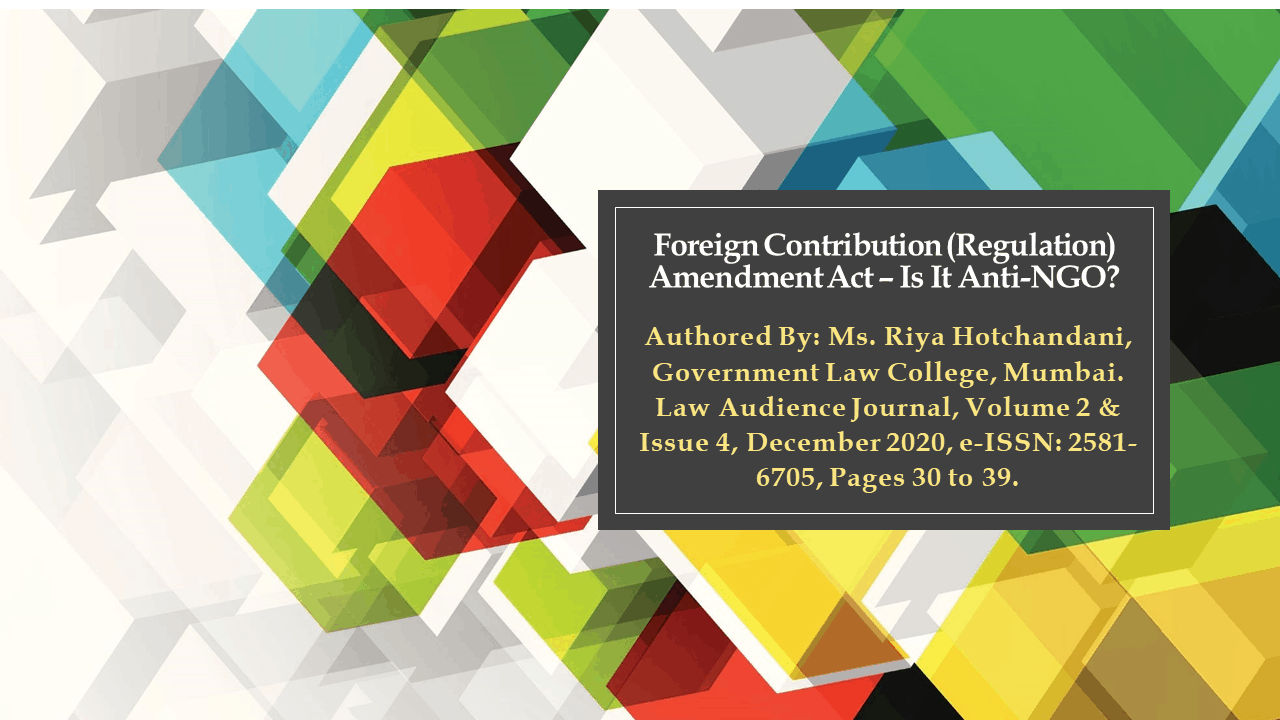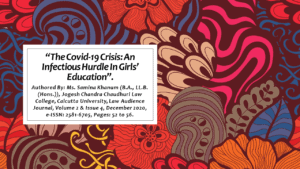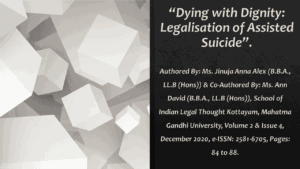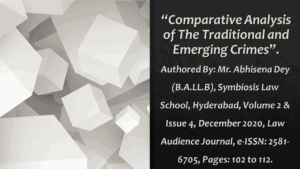Click here to download the full paper (PDF)
Authored By: Ms. Riya Hotchandani, Government Law College, Mumbai.
Click here for Copyright Policy.
Click here for Disclaimer.
I. INTRODUCTION:
Recently, the Parliament passed 27 bills in the seven-day monsoon session that took place in September, 2020. The Foreign Contribution (Regulation) Amendment Bill is one of them. The Act was originally passed by the Indira Gandhi-led government in 1976 during the Emergency in order to ensure that her rival political parties and media could not get money from overseas. It was then modified in 2010 with an aim to prohibit acceptance and utilization of foreign contribution or foreign hospitality for any activities detrimental to national interest. Interestingly, the Act is now amended again and passed by both the Houses and has received Presidential assent.[1] However, the Act gained widespread criticism on the ground of it being Anti-NGO and the provisions of the Act being stringent and overbroad.
II. WHAT WAS THE ACT AND WHAT ARE THE AMENDMENTS MADE THEREIN?
The Act seeks to regulate foreign funding received by individuals, associations and companies. The Act defines ‘foreign contribution’ as, “donation, delivery or transfer made by any foreign source – of any article, of any currency (whether Indian or foreign) or of any security.[2] The Act provides a detailed definition of ‘foreign sources’, linked with a common thread being that the ‘source’ of the funds is established in a foreign territory. For an organization to be eligible for receiving foreign contribution, it is a prerequisite that they have a definite cultural, economic, educational, religious or social program. Such contribution gets accepted once it is approved by the Government of India, through the Ministry of Home Affairs. An organization either has to seek prior permission every time it receives foreign funding or has to obtain a one-time long term registration, the validity of which extends for a period of 5 years. Once the permission is sought, a bank account has to be opened and maintained solely for the purpose of receipt and utilization of foreign funds. The Act makes it mandatory that the contributions received should be utilized only for the purpose of which they are received and puts restrictions on their transfer.[3]
II.I AMENDMENTS TO THE ACT:
- The Act prohibits certain persons from accepting any foreign contribution which includes candidates contesting election, editor or publisher of a newspaper, judges, government servants, member of any legislature, political parties, among others. The amended Act adds public servants (as defined in the Indian Penal Code) to the list.[4]
- The transfer of funds which was previously allowed has now been amended to forbid transfer of foreign contribution to any other person.[5]
- Another key amendment to the Act restricts acceptance of foreign funding in any other account and provides that foreign contribution must be accepted only in a designated “FCRA Account” in such branch of the State Bank of India, New Delhi, as specified by the Central government.[6]
- Under the Act, a person has to file for renewal of registration within six months of its expiration. The amended Act empowers the government to conduct an enquiry before the renewal of registration that the person is not fictitious or benami, has not been prosecuted or convicted for activities aimed at religious conversion, has not been found guilty of diversion or mis-utilization of funds and other conditions.[7]
- The amended Act reduces the limit of usage of foreign contributions for administrative expenses from 50% to just 20%.[8]
- The Act provided for suspension of registration of a person for a period not exceeding 180 days. The new provision, however, provides for an additional 180 days extension of such suspension.[9]
- Another interesting amendment to the Act says that any person seeking prior permission, registration or renewal of registration has to provide the Aadhaar number of its office-bearers, directors or key functionaries, as an identification document. For the foreigners, it is mandatory to provide a copy of the passport or the Overseas Citizen of India Card.
III. WHY WAS THE BILL PASSED?
Amid Opposition protest and boycott, the Bill has been unanimously passed by the Rajya Sabha. The government has contended that the Bill seeks to ensure transparency so that foreign funding is not utilized for anti-national purposes. The reduction of limit of usage of funds for administrative expenses has been backed by the argument that spending should be only on the main objectives. It is alleged that foreign contributions and their expenditure are improperly disclosed and audited by the NGOs (Non-Government Organizations) and such steps are necessary for the internal security of the country.[10]
Replying to the discussion in the Lok Sabha, Minister of State for Home Affairs, Nityanand Rai said that the Bill was “not against NGOs or an attack against a religion or community, and it will not stop foreign contribution.” Adding to that, he said that the bill was a step towards an ‘Atmanirbhar Bharat’ and is in the interest of national security and is aimed at ensuring that the funds are used in the right direction.
Answering to another question regarding as to why was the limit reduced to 20%, he said, if an NGO meant for civil work is using 50% of its contribution on itself then how is it supposed to do its expected work? He went on further to accuse NGOs of spending the funds on their family members by appointing them as karamcharis (workers) and paying them salaries. Moreover, the Minister added that, “if one is seen buying big cars, installing 3-4 air conditioners, all in the name of administrative expense, then what good work are they really doing for the society?”[11] These amendments are necessary to keep proper checks and balance to ensure that the funds are not misused. Quoting former Finance Minister P Chidambaram, who told the Parliament earlier that “about Rs 20000 crore funding was received by NGOs but nobody knew where did the Rs 10000 crore out of it, go.” On issues raised by the members on mandatory opening of an account in the SBI, he stated that the bank was chosen because it has a branch in every part of the country. On another key aspect of compulsory furnishing of Aadhaar number by the NGO members, he said that according to the order of the Supreme Court, government is free to bring a law to use Aadhaar to identify certain category of people. Further, replying to the question of misuse of foreign contributions, BJP leader Arun Singh alleged that the funds were used by NGOs to support extremists and anti-national outfits, to which BJP MP Satyapal Singh added that many Christian NGOs have been found using funds to convert people from Hinduism.[12] Moreover, it was also pointed out that government and intelligence reports have shown how insurgency increased in the North-East with money brought through foreign contribution. Backing it with the example of Graham Staines, an activist burned with his two children, BJP MP SP Singh alleged that as confirmed by a CBI probe, it was due to people’s suspicion that he was converting tribal people. He also stated that this has led to the rise of a ‘particular religion’ in the North-East.[13]
IV. HOW AND WHY IS THE ACT ANTI-NGO?
- No public/political discussion: The NGOs are major stakeholders in the present Act; however, they were not consulted before it was brought in the Parliament. There was no pre-legislative consultation on the Bill and no public or political discussion to seek the opinion of the NGOs. The Act largely affects the NGOs since it is mandatory for all of them (receiving foreign contribution) to register themselves under the FCRA. Still the Act was stealthily passed even after the NGOs being the biggest beneficiary of the FCRA.[14]
- Whole sector being targeted: The Act seeks to paint the entire sector with the same brush. While there may be organizations which have misused foreign funds or have violated FCRA norms, the government is trying to regulate the entire sector with the stringent amendments that have been passed. With utter disregard to the amount of civil work the NGOs do, rather than holding those misusing funds accountable through thorough audits, the Act discourages organizations working on voluntary basis by clauses such as limiting administrative expenses, restricting transfer of funds, making the renewal process complicated and extending the period of suspension of registration.
- Deathly for small NGOs: The Act prohibits transfer of funds to any other person. Being non-profit organizations, the operation of NGOs depends completely on donations, including both domestic and foreign. According to the reports published recently, as many as 11,000 NGOs have lost their permit to receive foreign contributions because of the violation of the Act. The NGOs, on the other hand, have contended that the Act has been misused to suppress dissent, especially on government policies.[15]K. Singh, the founder and Managing Director of an NGO, Leads Trust, said that, “the format in which we work is that all organizations are not equally competent in raising funds. So the bigger organizations raise funds and pass them to NGOs working among tribal people and other backward and unreached section of the society.” The Act has now put the survival of a hundred of NGOs and countless grass-roots activists at stake now.
- Utmost need of NGOs in times when we are fighting a global pandemic: In a crucial time when we have the Covid-19 crisis at peak, the government rather than supporting the cause for which these organizations work, has acted counterintuitively. The NGOs have played a vital role in battling with the adverse effect of the pandemic. Whether it is the migrant workers’ crisis or it is the unemployment which the pandemic worsened or it is the supply of basic necessities to remote parts of the country, these organizations have aided the government in minimizing the amount of damage which the pandemic has brought.[16]
- Discriminatory against the NGOs: Despite the Supreme Court’s direction that Aadhaar is not a mandatory document, the Act has made it compulsory to furnish Aadhaar number. As Justice Sikri pointed out in the landmark judgment on the constitutionality of the Aadhaar Act[17], there is a fundamental difference between Aadhaar card and identity. Once the biometric information is stored, it remains in the system, he said. The Apex Court in the case struck down the provision of the Aadhaar law which allowed sharing of data on the ground of national security.[18] However, the basis on which Aadhaar number is required to be furnished as an identification document for seeking prior permission or registration under the FCRA still remains unexplained on the part of the government. In addition to that, another provision of the Act disallows public servant from receiving any foreign contribution and as a result those NGOs which employ public servants are forbidden from receiving foreign funds. But public servants including the Hon’ble Prime Minister who is a part of the PM-CARES Fund, which invites foreign donations, are clearly exempted from the Act.[19]
- Limitations on administrative expenses: An NGO working for a civil cause need a lot of human resources to execute the work that it does. On the basis of some Intelligence Bureau reports on a handful of NGOs misusing funds in the name of administrative expenses, directly reducing the limit to 20% from the previous 50% will be too harsh on the entire sector.
Moreover, the Act is not just about the NGOs, it is against India’s international legal obligations and constitutional provisions to respect and protect the right to freedom of association, expression and freedom of assembly. The International Court of Justice (ICJ) has, in fact, condemned the adoption of the Bill by both the houses and has called on the President to withhold his assent.[20]
However, while looking at the larger picture, the Act is just one of the steps that the government is taking to suppress voices of dissent against it and is trying to turn India into a fascist state. Recently, Amnesty International, one of the most respected organizations in the world, announced its shut down in India because its bank accounts were frozen by the Modi government.
The executive director of the organization has pointed out that the organization has unequivocally called for transparency in the government, especially in the case of grave human rights violation in Delhi riots and in Jammu and Kashmir.[21] The Act is not just against one organization but against all the NGOs which have previously criticized government on its human rights violations, whether it is riots that happened during the Citizenship Amendment Act or during the Covid-19 crisis.
V. WHAT IMPACT DOES LEAVING OF NGOS LIKE THE AMNESTY INTERNATIONAL CREATE IN INDIA?
The government’s move which led to the human rights organization to halt its operation in India, has attracted criticism from International Organizations, which have called the move “politically motivated” and a violation of international human rights law and standards. The organization has been working in India for the last eight years and has over 2 million subscribers and supporters who work for the cause of human rights. It is estimated that almost 150 employees will lose their jobs as a result of its shut down.[22]
The role which organizations like the Amnesty International play cannot be ignored. Whether it is the education of the deprived children; whether it is fighting child labour or providing free legal aid to women against discrimination or gender bias or it is helping the poor during the Covid-19 crisis, the NGOs have been omnipresent and have reached sectors where the government couldn’t. These organizations have been active in filing petitions and Public Interest Litigations for various instances of human rights violations on behalf of those who were unable to reach the Court.[23]
While looking specifically at Amnesty International, the Organization has been active in reporting cases of child abuse including the cases reported under the Protection of Children from Sexual Offences Act (POCSO) and spreading awareness among children to understand such offences. It has also worked in the field of gender based violence highlighting how women, especially from marginalized section, are a victim of sexual offences. Furthermore, emphasis has been laid on social media platforms, which have been an important tool to abuse women, especially women politicians in India. The organization backs its data on 114,716 tweets that it analyzed which mentioned 95 Indian women politicians. It has also reported about the human rights violations in Jammu and Kashmir which includes unlawful killings, rape and other crimes that go unreported and unpunished.[24] Thus, with the new law coming in, it is difficult to presume what impact it will have on the ground level and how tougher it will be for the NGOs working in India to survive, however, for the organizations that were forced to leave, it can be safely concluded that it is a big setback for the defenders of human rights, civil society organizations and most importantly, for those people for whom these organizations have been working.[25] Moreover, it is equally important that free speech and freedom of expression are not curtailed and that laws should be what pleases the constitution and not the government.
VI. SOLUTION/SUGGESTIONS:
The grounds on which the Act has been passed by the government could be viewed from a different perspective. Coming down on the entire sector cannot be the solution as those actually misusing foreign funds could be punished under a separate law. The government can constitute a body which can look into the audits and annual expenditure of these organizations. The administrative expenses of those NGOs diverting funds for other purposes can be scrutinized with the help of the accounts which these organizations maintain. The stakeholders should be duly consulted such that their voice is heard and their concerns are addressed. Moreover, in times of a global pandemic, the government should provide them with incentives and resources rather than depriving them of what they already have.
VII. CONCLUSION:
With the government coming up with new laws one by one without proper consultation with the respective stakeholders, it is essential that we understand that these are not just a piece of legislation but a big threat to the democracy we enjoy right now. Today, one dissenting voice is suppressed; tomorrow we may not know what all will be termed as “anti-national” and what will be done in the name of national interest. With global concerns being raised on the FCRA Bill, it is important to understand India’s international obligations and its image that is deteriorating as far as human rights violations are concerned.
Moreover, it is still questionable as to why these amendments were needed in the first place and why is the government turning a blind eye towards the impact that the Act will have on the working of the NGOs. The Act is making them further vulnerable to harassment and will increase the cost of doing business in India. While the Act is said to be implemented to ensure transparency and prevent the usage of the funds for anti-national purposes, it should not be used to achieve other goals in the name of national security.
[1] Foreign Contribution (Regulation) Amendment Act, 2020, No. 33, Acts of Parliament, 2020 (India).
[2] Foreign Contribution (Regulation) Act, 2010, § 2(1)(h), No. 42, Acts of Parliament, 2010 (India).
[3] Overview of the FCRA in India, LEXOLOGY (July 3, 2015) https://www.lexology.com/library/detail.aspx?g=f86ace93-2a47-4ed0-a88a-d54912e1c0e0.
[4] Foreign Contribution (Regulation) Act, 2010, § 3(1), No. 42, Acts of Parliament, 2010 (India).
[5] Foreign Contribution (Regulation) Act, 2010, §7, No. 42, Acts of Parliament, 2010 (India).
[6] Foreign Contribution (Regulation) Act, 2010, §17, No. 42, Acts of Parliament, 2010 (India).
[7] Foreign Contribution (Regulation) Act, 2010, §12, No. 42, Acts of Parliament, 2010 (India).
[8] Foreign Contribution (Regulation) Act, 2010, §8, No. 42, Acts of Parliament, 2010 (India).
[9] Foreign Contribution (Regulation) Act, 2010, §13, No. 42, Acts of Parliament, 2010 (India).
[10] Parliament passes FCRA Amendment Bill; government says bill not against any NGO, ECONOMIC TIMES, September 23, 2020.
[11] Ananya Bhardwaj, FCRA Bill not against NGOs, meant to stop misuse of foreign funds, says Minister Nitayanand Rai, THE PRINT (Sept. 21, 2020, 10:01 PM), https://theprint.in/india/fcra-bill-not-against-ngos-meant-to-stop-misuse-of-foreign-funds-says-minister-nityanand-rai/507656/.
[12] Parliament passes FCRA Amendment Bill; government says bill not against any NGO, THE NEW INDIAN EXPRESS, September 23, 2020.
[13] Suchitra Karthikeyan, LS passes FCRA Amendment Bill 2020 after heated debate on mandating aadhaar registration, REPUBLIC WORLD (Sept. 21, 2020, 21:00 PM), https://www.republicworld.com/india-news/politics/lok-sabha-passes-fcra-bill-after-heated-debate-on-aadhaar-card.html.
[14] Gaurav Bhatnagar, How FCRA Amendment Bill will hamper research, hurt NGO work, impact jobs, THE WIRE (Sept. 22, 2020), https://thewire.in/government/watch-explainer-fcra-amendment-ngo-research-jobs.
[15] Ramesh Vaidyanathan and Laxmi Joshi, Foreign funding for NGOs: Regulatory complainces, BUSINESS TODAY (Feb 13, 2017, 19:30 PM), https://www.businesstoday.in/opinion/columns/foreign-funding-for-ngos-regulatory-compliances/story/246270.html.
[16] FCRA being used to crack down on NGOs, but why no transparency on PM-CARES? THE WIRE (Sept. 25, 2020), https://thewire.in/government/fcra-amendment-bill-transparency-ngos-crackdown.
[17] Justice K.S. Puttaswamy v Union of India, (2017) 10 S.C.C 1 (India).
[18] What’s valid and what’s not: everything you need to know about aadhaar verdict, ECONOMIC TIMES, September 26, 2018.
[19] Gaurav Bhatnagar, How FCRA Amendment Bill will hamper research, hurt NGO work, impact jobs, THE WIRE (Sept. 22, 2020), https://thewire.in/government/watch-explainer-fcra-amendment-ngo-research-jobs.
[20] India: FCRA Amendment 2020 will undermine the work of Civil Society, INTERNATIONAL COMMISSION OF JURISTS (Sept. 24, 2020), https://www.icj.org/india-fcra-amendment-2020-will-undermine-the-work-of-civil-society/.
[21] India pushes out Amnesty International, accelerating its march towards authoritarianism, THE WASHINGTO N POST (Oct. 2, 2020, 2:59 AM), https://www.washingtonpost.com/opinions/2020/10/01/india-pushes-out-amnesty-international-accelarating-its-march-toward-authoritarianism/.
[22] FCRA Law: 15 International organizations condemn Centre’s move to freeze Amnesty India’s account, SCROLL.IN (Oct. 1, 2020, 1:44 PM), https://scroll.in/latest/974605/fcra-law-15-international-organisations-condemn-centres-move-to-freeze-amnesty-indias-account.
[23] Jyosna Dighe, Realization of human rights-Role of NGOs, LEGAL SERVICE INDIA, http://www.legalservicesindia.com/article/1275/Realization-of-Human-Rights-and-Role-of-NGO.html.
[24] Ongoing programmes, AMNESTY INTERNATIONAL INDIA, https://amnesty.org.in/our-work/.
[25] Joanne Lin, Amnesty International calls for India to lift account freeze to resume vital human rights work, JUST SECURITY (Oct. 10, 2020), https://www.justsecurity.org/72780/amnesty-international-calls-for-india-to-lift-account-freeze-to-resume-vital-human-rights-work/.



